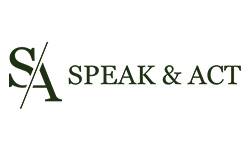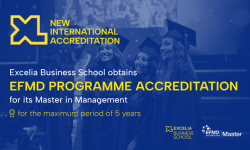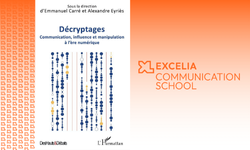
A personalised welcome to help you settle into the School.
- Welcome Days
-
As international students, you will receive a special welcome to help you settle into Excelia and to discover the city of your campus, your new study environment.
Our Welcome Days, organised by the International Office, are an opportunity to bring together all our international newcomers, whether they are on exchange or otherwise.
These Welcome Days take place just before the start date of your study programme.
Welcome Days… so what's on the agenda?
- Registration and coffee
- Presentation of the administrative procedures in France
- Getting to know the school and campus
- Meeting your Mobility Coordinator (for students on exchange)
- Some fun activities at the end of September/beginning of October (for all international newcomers)
Welcome Booklet
- WELCOME BOOKLET LA ROCHELLE CAMPUS
- WELCOME BOOKLET TOURS CAMPUS
- WELCOME BOOKLET ORLEANS CAMPUS
- WELCOME BOOKLET PARIS CACHAN CAMPUS
Welcome Days 2023
- Administrative formalities for foreign students in France
-
We explain everything to you in this video:
If this is your first time in France as a student: Validating your VLS-TS visa
The majority of international students arrive in France with a long-stay visa, which also acts as a residence permit. It is a 12-month visa known as a VLS-TS and must be validated upon your arrival in France, and within 90 days at the latest. This validation is done online.
To validate your visa online, you will need:
- a current email address
- the information detailed on your visa
- to confirm the date of your arrival in France
- to confirm the address in France where you will be stayingYou will also require a credit card to pay the visa fee online.
If you don’t have a credit card, don’t worry! You can buy an electronic stamp at a Bureau de tabac (tobacconist’s) and pay for it in cash.
Once online, fill in the information found on your visa: visa number, start and end date of validity, date of issue, reason for stay.
Enter any additional information such as marital status, phone number, e-mail address.
Indicate your date of arrival in France as well as your address in France.
Paying the visa fee of 50 euros:
Option 1: you can pay by credit card
Option 2: you can buy an electronic stamp online – this option will be displayed on the screen
Option 3: you enter the number of the electronic stamp that you have previously purchased at a Bureau de tabac.
Download the confirmation of your VLS-TS visa validation. You can also download it later by logging back on to your personal account or by downloading the confirmation email that is sent to you.
Your visa has now been validated!
You will receive two emails:
The first email will contain your login details. These will allow you to access your personal account, where you will find confirmation of your VLS-TS visa validation (which can then be downloaded if needed). Please keep your login details safe, as you will need to log back on to this portal if you need to apply for a residence permit at the end of your first year in France. The second email will confirm the information you entered online.
If you are under 18 and currently still at school or if you are an Algerian national, you do not have to validate anything online. Instead, you need to apply directly for a residence permit. If you need help or have any questions about this, please contact Claire Fresnais ([email protected]).
If this is not your first year in France as a student
If your visa or residence permit is about to expire, don’t forget to renew it via the ANEF online platform.
Note: if you enrolled in the School but are a minor or an Algerian national, you do not have to validate your visa online. You can immediately apply for a residence permit.
For any questions about visas or residence permits, contact Claire Fresnais at the International Office: [email protected]
Joining the Social Security system
If you are a student who is not a citizen of an EU country, and you are staying in France for more than 4 months, you must join the French Social Security system, which provides health insurance for all French citizens. It costs nothing to join and must be done once you have arrived in France, after you have enrolled in your higher education establishment.
1. Register on the following website: etudiant-etranger.ameli.fr
Enter your personal information: family name, first name, date of birth, country of birth, email address, postal address in France and telephone number.
2. Upload the supporting documents required: passport, visa AND your validation of visa or residence permit, copy of birth certificate, proof of School enrolment for the current year, IBAN, etc. Note: depending on your country of origin, additional documents may be required.
3. Create an account and download your provisional proof of registration for Social Security. With this document, you will benefit from French health insurance and will be reimbursed about 65% of the cost of any health expenses.
Submit any missing or non-compliant supporting documents in your personal account, where necessary. As soon as you receive your NIR number (Social Security registration number), you can download your definitive proof of registration to the Social Security system and create your online personal account.
4. Open your personal ameli account at www.ameli.fr or via the ameli application.
5. Apply for a health insurance card, known as a Carte Vitale.
6. Declare your choice of Doctor, known as a Médecin traitantTutorial on "Joining the Social security system"
Taking out complementary health insurance
As the health insurance system reimburses you for up to 65% of your health expenses, you may decide to take out additional insurance to ensure 100% reimbursement of your expenses. It’s up to you to assess your needs and choose the insurance that best suits you. We strongly advise you to at least take out a hospitalisation insurance so that in the event of a hospital stay, you will be reimbursed 100% of the costs.
Our partner SMERRA offers special rates to international students at Excelia.
Contact: [email protected]
Paying the CVEC subscription
The Student Life and Campus Contribution (CVEC) is a fee that all students must pay at the beginning of the academic year. For the 2024-2025 academic year, the fee is €105. Exchange students, refugees and asylum seekers do not have to pay this fee.
To pay the fee, go to the following website: cvec.etudiant.gouv.fr
Payment is made online. Your proof of payment must then be uploaded to your personal account on WebGaïa.
Opening a bank account
It is very useful to have a bank account in France, especially if you are studying in the country for more than 3 months. A bank account will make it easier to pay your bills, receive a salary or housing benefit, and you will need it to receive your reimbursement for any health expenses.
You are free to open an account at the bank of your choice. Make sure you compare the offers of a few different banks, as the cost of a debit card, international transfers and money withdrawals abroad can vary significantly.
To open a bank account, you will need 3 documents:
- a piece of ID
- a proof of School enrolment
- a proof of address -
If this is your first time in France as a student: Validating your VLS-TS visa
The majority of international students arrive in France with a long-stay visa, which also acts as a residence permit. It is a 12-month visa known as a VLS-TS and must be validated upon your arrival in France, and within 90 days at the latest. This validation is done online.
To validate your visa online, you will need:
- a current email address
- the information detailed on your visa
- to confirm the date of your arrival in France
- to confirm the address in France where you will be stayingYou will also require a credit card to pay the visa fee online.
If you don’t have a credit card, don’t worry! You can buy an electronic stamp at a Bureau de tabac (tobacconist’s) and pay for it in cash.
Once online, fill in the information found on your visa: visa number, start and end date of validity, date of issue, reason for stay.
Enter any additional information such as marital status, phone number, e-mail address.
Indicate your date of arrival in France as well as your address in France.
Paying the visa fee of 50 euros:
Option 1: you can pay by credit card
Option 2: you can buy an electronic stamp online – this option will be displayed on the screen
Option 3: you enter the number of the electronic stamp that you have previously purchased at a Bureau de tabac.
Download the confirmation of your VLS-TS visa validation. You can also download it later by logging back on to your personal account or by downloading the confirmation email that is sent to you.
Your visa has now been validated!
You will receive two emails:
The first email will contain your login details. These will allow you to access your personal account, where you will find confirmation of your VLS-TS visa validation (which can then be downloaded if needed). Please keep your login details safe, as you will need to log back on to this portal if you need to apply for a residence permit at the end of your first year in France. The second email will confirm the information you entered online.If this is not your first year in France as a student
For any question about visas and residence permits, contact Claire Fresnais: [email protected]
If you have a visa or a residence permit that will soon expire, remember to go to the School’s International Department to apply for a visa renewal.
Note: if you enrolled in the School but are a minor or an Algerian national, you do not have to validate your visa online. You can immediately apply for a residence permit.
Joining the Social Security system
If you are a student who is not a citizen of an EU country, and you are staying in France for more than 4 months, you must join the French Social Security system, which provides health insurance for all French citizens. It costs nothing to join and must be done once you have arrived in France, after you have enrolled in your higher education establishment.
1. Register on the following website: etudiant-etranger.ameli.fr
Enter your personal information: family name, first name, date of birth, country of birth, email address, postal address in France and telephone number.
2. Upload the supporting documents required: passport, visa AND your validation of visa or residence permit, copy of birth certificate, proof of School enrolment for the current year, IBAN, etc. Note: depending on your country of origin, additional documents may be required.
3. Create an account and download your provisional proof of registration for Social Security. With this document, you will benefit from French health insurance and will be reimbursed about 65% of the cost of any health expenses.
Submit any missing or non-compliant supporting documents in your personal account, where necessary. As soon as you receive your NIR number (Social Security registration number), you can download your definitive proof of registration to the Social Security system and create your online personal account.
4. Open your personal ameli account at www.ameli.fr or via the ameli application.
5. Apply for a health insurance card, known as a Carte Vitale.
6. Declare your choice of Doctor, known as a Médecin traitantTutorial on "Joining the Social security system"
Taking out complementary health insurance
As the health insurance system reimburses you for up to 65% of your health expenses, you may decide to take out additional insurance to ensure 100% reimbursement of your expenses. It’s up to you to assess your needs and choose the insurance that best suits you. We strongly advise you to at least take out a hospitalisation insurance so that in the event of a hospital stay, you will be reimbursed 100% of the costs.
Our partner SMERRA offers special rates to international students at Excelia.
Contact: [email protected]
Paying the CVEC subscription
The Student Life and Campus Contribution (CVEC) is a fee that all students must pay at the beginning of the academic year. For the 2024-2025 academic year, the fee is €105. Exchange students, refugees and asylum seekers do not have to pay this fee.
To pay the fee, go to the following website: cvec.etudiant.gouv.fr
Payment is made online. Your proof of payment must then be uploaded to your personal account on WebGaïa.
Opening a bank account
It is very useful to have a bank account in France, especially if you are studying in the country for more than 3 months. A bank account will make it easier to pay your bills, receive a salary or housing benefit, and you will need it to receive your reimbursement for any health expenses.
You are free to open an account at the bank of your choice. Make sure you compare the offers of a few different banks, as the cost of a debit card, international transfers and money withdrawals abroad can vary significantly.
To open a bank account, you will need 3 documents:
- a piece of ID
- a proof of School enrolment
- a proof of address - Accommodation in France: we explain it all!
-
There are many accommodation options available for your time in France. You can choose between accommodation in the public sector (CROUS) or in the private sector, in a student residence or in an apartment, alone or in a shared apartment/house, in a room in a private home or in independent accommodation...
Whichever you decide, we recommend that you start your housing search as soon as possible. Don’t hesitate to reserve accommodation in advance, even if it’s temporary, so that you have a roof over your head when you arrive. This will give you time to look for permanent accommodation in a relaxed manner.
Public sector university residences (CROUS)
The CROUS residences are public-owned and State-subsidised. This is the most popular type of accommodation for students. It has many advantages: the rent is low, your place of study is close by, and there is a good social life. However, for this accommodation, priority is given to students receiving grants from the French Government.
Private student residences
These are more expensive than the CROUS accommodation but they also have many advantages: communal living, furnished rooms, internet, laundry, gym, etc.
In La Rochelle, there are a number of private student residences including Les Estudines, New Rochelle, Appart'City, Cap'Etudes, and H2O. For this type of residence in La Rochelle, you will have to budget for an average of €550 per month.
Private sector accommodation
These are privately owned apartments rented by individuals or via real estate agencies. You can rent a whole apartment or a single room in an apartment/house.
The prices reflect the local real estate market, and vary considerably from city to city. In La Rochelle, you should budget for a minimum of €480 for an individual studio, in Tours it is more likely to be €450 for a similar studio.
To rent an apartment directly from a private individual, without going through an agency, you can consult the advertisements on the sites Particulier à Particulier or leboncoin.
Many students choose to rent larger apartments and to share the apartment with others. This makes it possible to split not only the rent, but also the costs of electricity, gas and internet. You can find roommate ads on the sites appartager, roomlala, immojeune, or la carte des colocs.
Room in a private house
International students often choose to live with a French family as it is an ideal way to help them improve their language ability! It is a practical and economical solution: a room of your own in an apartment or a house, living with a local family, and benefitting from home comforts with all the facilities you need.
The guarantor
In France, whether you are a foreigner or French, a guarantor is always required when you rent an apartment. A guarantor is someone who agrees to pay your rent if you can no longer afford to do so.
Your guarantor must be French. If you don’t have one, other solutions are available to you: the VISALE guarantee (provision of rental guarantee) or the Studapart Guarantee (if you use Studapart – Excelia’s student accommodation platform). Thanks to this platform, international students without a French guarantor can have access to the Studapart Guarantee, a paid service that replaces the French guarantor.
The tenancy agreement
This is the rental agreement signed by both parties: the tenant (you) and the owner (also known as the landlord). Make sure you have signed a lease before taking possession of a property. Whether you are renting from an individual, a host family, in a private or a CROUS residence, a rental agreement is compulsory. It provides legal proof of the transaction between the two parties and it specifies the clauses of the contract (duration, monthly rent, amount of the deposit, departure notice required). Never agree to rent a property without a tenancy agreement, as you would be taking a major risk.
Inventory
This is a document that records the condition of the accommodation on the day you become a tenant, and on the day you leave the property. It shows the condition of the walls, floors and furniture. It may also contain a list of the equipment provided if the accommodation is furnished.
There are two inventories of fixtures and fittings:
- The inventory on entry (when you arrive)
- The inventory on exit (when you leave)
These documents must be signed by both parties.
Understanding classified ads
The number of rooms indicated in the classified ads corresponds to the number of ‘living spaces’ (bedrooms, lounge, dining room). It does not include the kitchen, bathroom or corridors. For example, an ad specifying ‘deux pièces’ means that the accommodation will include one bedroom and a lounge, in addition to a kitchen area and a bathroom or shower room.
To help you, here is a list of the most common words and abbreviations:
Studio: one room with a kitchenette in it
T2 or F2: a two-room apartment
T3 or F3: a three-room apartment
SDB: bathroom (with a bath)
SDE/Salle d’eau: shower room
RDC: Ground floor
Asc: Lift
TBE: Very good condition
CC: Utilities and other charges included. These amounts are included in the rental cost to cover the maintenance of the building as well as any other communal charges (cleaning of the common areas such as stairwells, rubbish collection, etc)
Important advice:
Don’t wait until you arrive in France to start your accommodation search – make enquiries online from wherever you are! Beware of rents that are too low Try to rent furnished accommodation – this will save you money when moving in.- Never send money ahead, without having first signed a contract and having spoken directly with the rental organisation
- Avoid paying rent in advance
Don’t forget to read our web page Finding accommodation
Excelia's Platform
Excelia has its own accommodation platform to help you with your search and reservation.
Via this platform, you can access offers for residences or from private individuals, you can also buy the Studapart Guarantee if you do not have a French guarantor, and you can also reserve your accommodation remotely, even before arriving in France. It’s very helpful when applying for a visa! As soon as you are enrolled at the School, you will receive instructions about how to connect to the platform.
And remember… think ahead! Start your search at least two months before the start of your programme.
Remember: plan ahead!
Begin your search at least 3 months before the start of your programme, and definitely BEFORE 15th July for a September start!
Below, you will find links containing useful information about the platform:
Visale guarantee
The Visale guarantee makes it easier for you to rent accommodation! Visale covers unpaid rent as well as any damage to the property occupied. It is not only a reliable guarantee but it is free, and will strengthen your rental application. It is very useful for students who do not have a guarantor.
- "Buddy" scheme for international students
-
Buddy Programme is the name of Excelia’s programme whereby international students are supported and guided by local Excelia students. The objective of the scheme is to ensure that you are accompanied and guided by a peer, before your arrival in France and even during the first few days in the country.
The role of the buddy relies on everyone’s goodwill: providing advice to the newcomer before they leave their home country, welcoming them at the train station upon arrival, and even showing them around for the first month to help them find out about the best student deals in the city. So, if you’re coming to Excelia, don’t hesitate to sign up to the Buddy Programme and benefit from valuable advice from students who have already been down the same road!
To register, just send an email to: [email protected]
- Links to useful online resources
-
Welcome handbook 2021-2022 La Rochelle campus
Welcome handbook 2021-2022 Tours Campus
- CDIJ La Rochelle: regional youth information centre www.infojeunesse17.com
- A mine of useful information for students: jobs, voluntary work, training.
- And don’t forget the cafés linguistiques, where you can practice your foreign languages!
ADRIEM Association
The ADRIEM Association was established in 2001 with the objective of putting international students in touch with local residents within the La Rochelle area. Among other things, it aims to help students learn more about the French culture, improve their language skills and provide them with assistance for the various administrative procedures.
-
Academic Scholarships
-
The Eiffel Excellence Scholarship Programme
A programme of excellence rewarding EXceptional EXcelians!
Since 2019, we have had at least one scholarship awarded each year to one of our students.Created in 1999 by the Ministry for Europe and Foreign Affairs together with the Ministry of Education, this prestigious scholarship enables French higher education institutions to attract and reward international students with excellent academic backgrounds, who are looking to carry out post-graduate studies (Master) level.
The selection criteria are very specific and focus on…
• nationality: only international students can apply
• academic record: the academic results for the 3 years preceding the application are examined and must clearly demonstrate excellence
• the profile of the applicant which must reflect the international policy of the establishment: it is essential to demonstrate how hosting this student will strengthen the establishment’s international strategy and visibilityThe Eiffel Excellence Scholarship Programme focusses on 4 principal fields of study:
• Law
• Economics and Management
• Engineering Science
• Political SciencesFlywire Charitable Foundation Academic Scholarships
Every year the Flywire Charitable Foundation offers academic scholarships to students from around the world.
This scholarship programme is available exclusively to undergraduate students (Bachelor level).
The Flywire Academic Scholarships focus on 4 principal fields of study:
• Law
• Sustainable Development
• Health
• Intercultural Relations

 My Career Path
My Career Path





 My Career Path
My Career Path





